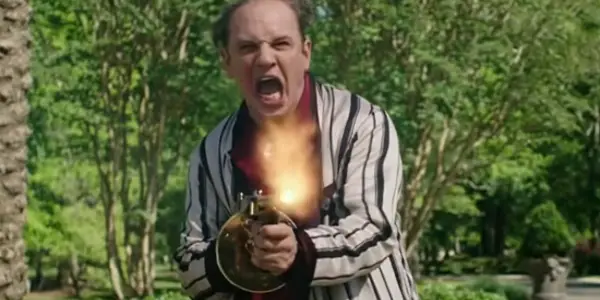CAPONE: How The Mighty Have Fallen

Stephanie Archer is 39 year old film fanatic living in…
Al Capone is one the most notorious gangsters of all time. Even in death, his brutal legacy still lives on both in books and media, as well as in the conspiracies that surround his life. In particular, the belief that before his incarceration, he hid 10 million dollars. A 10 million dollars that to this day has never been discovered.
Capone, written and directed by Josh Trank is the latest film to bring the gangster back into the spotlight, yet while others have focused on his ruthless reign, Trank turns the camera to his final year. A final year full of disease, paranoia and a search to recall that which his family will need the most – the hidden 10 million. Yet, as time is running out for Capone, the metronome counts down the hands of time for all those around him, both friend and foe.
Capone
The premise of Capone is fairly simple, yet intriguing. An aging gangster on his final leg, lost in paranoia and illness, struggles to remember where he hid his money. Throw Tom Hardy into the mix and you have a recipe for ultimate success. Unfortunately, as Capone proves, it takes more than just a solid idea and a strong performer to create cinematic magic.

After being released from prison, the justice system deeming him no longer a threat, Capone has found “peace” in his Florida estate to live out the rest of his days. Suffering from neurosyphilis and insanity, Capone clings to the remnants of truth around him, fighting to remember and struggling to forget. As the illness and strokes drag his disease and madness deeper, his memories and reality begin to blend within an overwhelming influx of hallucinations and paranoia.
Though as he struggles to remember where he hid the money, there are other forces at hand. The FBI, determined to prevent him from beating the system, descend on his property, utilizing every henchman still loyal to him, even turning those closest against him. In a race against time, it’s all or nothing.
An aging tale
Knowing this was to be an examination of the final year of Capone, I had expected the film to display something more maniacal, more brutal, maybe even more redemptive. Yet, viewers are left with no transcendence, only a raw and ugly portrait of a former kingpin as he struggles to live out his remaining days. And at times this works, the sympathy for the mobster seeping into your mind, urging you to root for his final moments, to push past the spilled blood and terror he induced on a city and look at what he has been stripped down to – a man. Yet, where the film finds some success, it also finds a need to look back with regret.

One of the biggest challenges Capone flounders with is the inclusion of so many characters surrounding the finality of Capone’s story. The film has a lot of players, but not much information. Even in the last half hour of the film, new characters are being introduced with new obscure motives – their importance and reasonings a mystery to the audience. There is little depth to each supporting character, much left for the audience to deduce themselves.
Had there been more of a backstory, more of an understanding about those who found themselves a part of Capone’s remaining time, I think it would have elevated the film. Where Capone is supposed to focus on an aging mobster struggling to remember the location of hidden treasure, its supporting cast takes focus, audiences attempting to figure out the “what” and “why” to their inclusion and actions. Friends, illegitimate sons, and ambitious FBI agents each have their turn in the spotlight, but with no purpose, no reason to push the storytelling forward.
With such a lackluster supporting cast of characters, Tom Hardy‘s performance becomes one you will find yourself questioning. Is he overacting or is he the gem in a sea of mediocrity? While I want to lean towards gem, his performance does not land the entirety of the film. There are moments of true Hardy fashion that shine through, proving he was supposed to play this role. Yet there are other moments that feel just as forced. While he is certainly committed to the role, drawing sympathy, and was certainly not afraid to get ugly, it was hard to actually connect with the character – especially as you were not sure what you were rooting for.

Capone also suffers form overused symbolism that viewers are led to in a hand-holding fashion. Long camera takes on burning fires, paintings on the wall and statues in the garden each have their moment of utilization, but become tired quickly and there is a sense of resentment at how obviously they are shown. One of the most overused elements of symbolism in Capone is a small boy carrying a golden balloon. While many can infer as to what it represents, the symbolism is lost, the movements of the balloon and its eerie appearance drawing back Stephen King‘s It.
Conclusion
As Capone ends, I found myself frustrated. I felt as though I had not come to know or understand Capone more than I already had. There was a story here, one that could have been captivating, but it became lost in sea of confusion. Unfocused to the core, Capone will leave viewers with more questions than answers.
Watch Capone
Does content like this matter to you?
Become a Member and support film journalism. Unlock access to all of Film Inquiry`s great articles. Join a community of like-minded readers who are passionate about cinema - get access to our private members Network, give back to independent filmmakers, and more.













